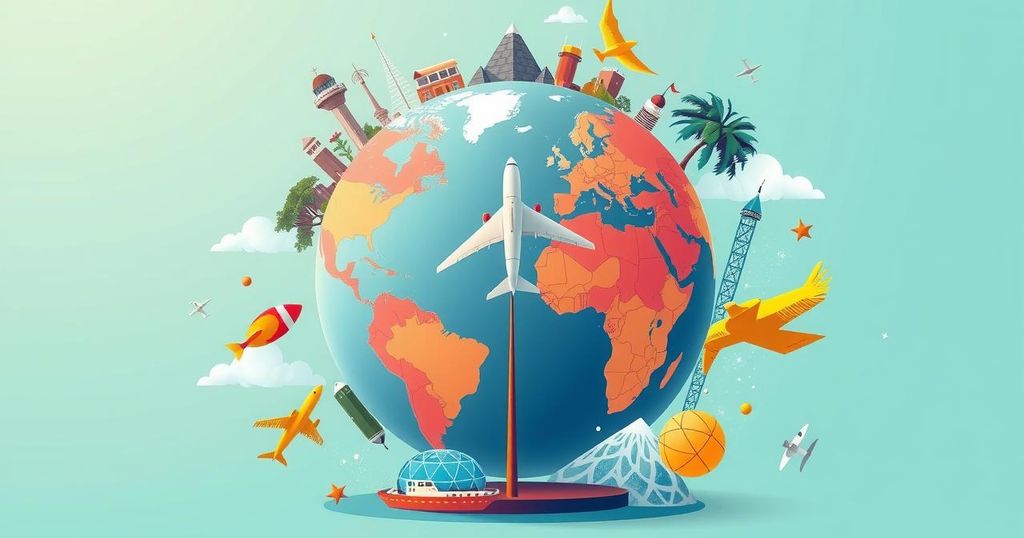Politics
AMERICAN EXPRESS, ASIA, BOOKING HOLDINGS, BRAZIL, CHINA, COSTA RICA, DATA ANALYSIS, EXPEDIA GROUP, EXPORTS, INDIA, INTERNATIONAL TRADE, JAPAN, MARKET RESEARCH, MARRIOTT INTERNATIONAL, MEXICO, NORTH AMERICA, PERU, SAUDI ARABIA, SOUTH AMERICA, SUPPLY CHAIN, UAE, UNITED STATES, USA, VISA-FREE TRAVEL
Clara Montgomery
AI and Market Growth: The Future of Global Travel from 2024 to 2028
The travel industry is predicted to experience remarkable growth, with an increase of $2.86 trillion from 2024 to 2028, driven by experiential travel and digital transformation. AI is playing a pivotal role in enhancing personalized travel experiences and optimizing industry operations. Despite challenges such as geopolitical risks, the sector is likely to see a diverse expansion across various geographic regions, focusing on sustainability and leveraging digital advancements.
The global travel industry is poised for remarkable growth, with projections indicating an increase of $2.86 trillion from 2024 to 2028, as per a report by Technavio. This expansion, projected at a CAGR of 11.1%, is fueled by factors such as a rising interest in experiential travel, advancements in digital technologies, and the integration of artificial intelligence (AI). Nevertheless, geopolitical challenges and security risks loom as potential hurdles for the sector’s growth.
The travel sector’s anticipated boom creates fresh opportunities for various stakeholders, including travelers, businesses, and destinations. There is a marked shift toward personalized experiences and digital enhancements, driven by increased spending from the growing middle class. Major players like Expedia Group, Marriott International, Booking Holdings, and American Express Global Business Travel are instrumental in navigating these shifts within the evolving market.
AI is transforming the travel landscape significantly, enabling companies to offer seamless, efficient, and tailored experiences. AI-driven analytics provide insights into consumer behavior, allowing for optimized pricing and improved customer engagement. This trend in AI adoption is set to make travel more customized and digitally integrated than in previous years, enhancing satisfaction and convenience for travelers.
As preferences shift away from conventional sightseeing, there is a rapid increase in demand for adventure-based and customized experiences, such as safari trips, culinary tours, and luxury train journeys. Furthermore, the business travel sector is rebounding, with companies increasingly blending leisure with work-related travel, resulting in enriched experiences that combine productivity with cultural immersion.
The anticipated growth in the travel sector is geographically diverse, with opportunities emerging across various regions. This diversity allows travelers to experience a wider range of attractions, catering to a mix of adventure, relaxation, and cultural experiences. However, industry challenges persist, necessitating adaptation and innovation for sustainable growth.
Sustainability remains a critical focus as the industry addresses environmental concerns, with eco-friendly tourism gaining traction among travelers who prioritize responsible choices. The impact of social media, influencer marketing, and user-generated content is reshaping how individuals discover and book their travel experiences, emphasizing authenticity in the travel narrative.
Moreover, as digital transformation reaches its zenith, personalized marketing strategies prioritizing immersive storytelling are crucial for influencing travel decisions. While leisure travel continues to drive growth, business travel plays an essential role as trends like hybrid working and corporate retreats reshape corporate travel practices.
The travel market anticipates a significant transformation by 2028, with AI-driven innovations and digital integration poised to redefine the journey of planning, booking, and experiencing travel. This evolution promises greater personalization, wider accessibility, and enhanced convenience for travelers navigating the ever-changing landscape of international tourism trends.
As the industry faces ongoing challenges, such as security issues and economic fluctuations, the outlook remains optimistic. The continued integration of AI and digital resources positions the travel market for unprecedented innovation and opportunity, paving the way for an exciting future in global tourism.
The travel industry is entering a substantial growth phase, characterized by a $2.86 trillion surge projected from 2024 through 2028. This growth is driven by a variety of factors including technological advancements, changing consumer preferences toward experiential travel, and significant contributions from artificial intelligence. Understanding the dynamics that shape this evolving market is critical for stakeholders aiming to capitalize on new opportunities in tourism.
In conclusion, the travel market is set for immense growth, propelled by factors such as AI advancements, experiential tourism, and digital enhancement. While challenges like geopolitical instability persist, industry evolution promises enhanced traveler experiences and personalized offerings. As AI and digitalization continue shaping global tourism, stakeholders can anticipate unprecedented innovations and opportunities over the next four years, ensuring a robust future for the sector.
Original Source: www.travelandtourworld.com








Post Comment